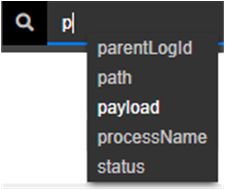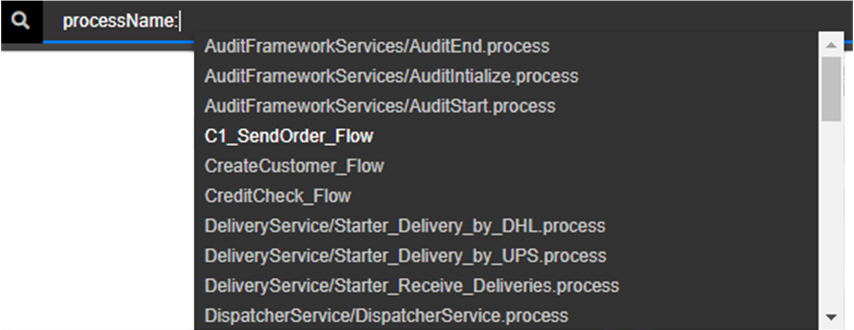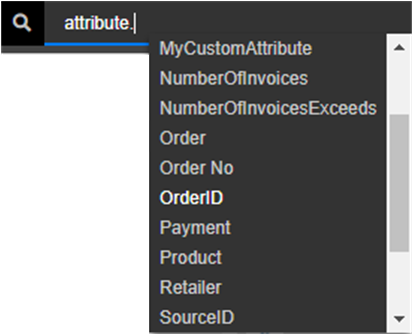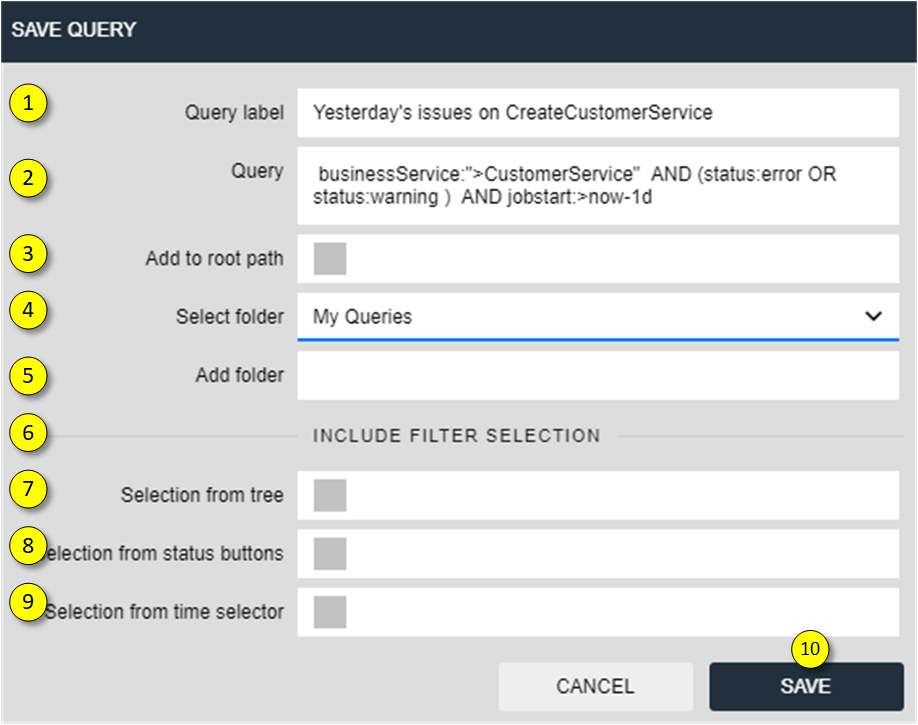Query¶
The Query bar is a complex, yet powerful tool to most rapidly narrow down the search for process instances. It is designed to allow simple search terms as well as complex expressions. A non-technical user may just want to search for a specific Order Number, a power user may want to enter more complex expressions. The wizard-like Query bar will suggest search values based on the set time window and the search criteria entered so far.

- Enter Query here
- Remove entire content of the Query line
- View the history of entered Queries during the current session
- Save the Query

- Result message of the last execution of the Query
Enter a valid search term in the Query line:

- Execute the Query by pressing RETURN or click on the update button on the right hand side
The Query returns with a new Result list and provides the execution status below the Query bar:

Wildcards: The following wildcards are allowed:
*matches any sequence of characters‘’?’’ matches exactly one single character
Examples:
processName:Starter*Searches for process executions where the process name starts with “Starter”.
processName:Starter?Create*Searches for process executions where the process name starts with “Starter?Create” and where any character between “Starter” and “Create”.
Logical operators: The following logical operators can be used in a Query:
Logical operators Example NOTNOT processName:Starter_C1_SendOrder Also allowed: !processName:Starter_C1_SendOrder ANDprocessName:Starter_C1_SendOrder AND status:error ORprocessName:Starter_C1_SendOrder OR processName:Starter_ReceiveOrderConfirmation_C1 Note
Logical operators have to be entered in upper case characters!
Auto suggest: Auto Suggest helps to enter the correct keywords and furthermore to find available content for a keyword. Just begin to type and Auto Suggest presents keywords according to the letter you type:

When you type “p”, you get a list with keywords that begin with “p”.
Select the keyword by pressing TAB and enter a colon “:” to separate keyword from search term. Right after entering a colon Auto Suggest will present a list with content that refers to the corresponding keyword. For example, select “processName”, enter “:” and Auto Suggest shows a list with process names known by nJAMS:

The list is limited to 50 elements. If the value is not part of the list, enter the first letter of the process name you want to search for:

Select the process name and press RETURN to add this value to the Query:

Search for Custom Attributes: You can also search by Custom Attributes.
Enter keyword “attribute” followed by a dot “.”. Auto Suggest will open a list of available Attributes Names known by nJAMS:

Select an Attribute Name and press
TAB.The following example searches for all process instances that contain the Custom Attribute “OrderID”. Just type a wildcard “*” for any Attribute Value:

The next example searches for all process instances that contain the Custom Attribute “OrderID” and a specific Attribute Value:

If you have no clue about the Attribute Name and you only know the order number you want to search for, it is also possible to search just for that particular value. The example below starts a fulltext search for the order number “F1110661”:

Search for Path: A path is represented by hierarchy of the Tree. The different levels of the Tree are separated by the
>character.The following examples explains how to search for various needs:
A valid fully qualified path may look as follows: path:">fs_pdi>C1_Services>C1_Services-C1_Services>OrderServices/C1/Starter_C1_SendOrder.process"
If you want to search for process instances that belong to the TIBCO BusinessWorks Engine “OrderServices-Orchestration” in any deployment of domain “fs_pdi”, a valid path is as follows: path:>fs_pdi>*>OrderServices-Orchestration>*
If you want to search for SAP inbound idocs of any client of system “NSP”, a valid path is as follows: ``path:>NSP>*>IDOC_INBOUND>* `` Search for period of time: It is also possible to search for Time. The are relative and absolute references of time.
Relative reference: example:
jobstart:>now-1dAbsolute reference: example:
jobstart:>2017-01-10T00\:00\:00Z jobstart:<2017-01-10T01\:00\:00ZNote
Timestamps in Query always refer to UTC timezone!
Reference of keywords: The following keywords are supported by this control:
DisplayValue Alias type Description activityCpuTime acct long Return all process instances, which have the activityCpuTime to the given value. activityDuration acd long Return all process instances, which have the activityDuration to the given value. activityName acn string Return all process instances, which have the activityName to the given value. activityTimestamp acts datetime Return all process instances, which have the activityTimestamp to the given value. attribute att fulltext The name of a custom attribute. Only process instances that have this attribute set will be returned by the search. If this keyword is directly followed by an Attribute value, the search will return only process instances where an attribute of the given name has the value given for. businessObject bo lowercasepath Return all process instances, which have the businessObject to the given value. businessService sn lowercasepath Return all process instances, which have the businessService to the given value. clientType lsrc string Return all process instances, which have the clientType to the given value. clientVersion clv string Return all process instances, which have the clientVersion to the given value. correlationId clid string Return all process instances that have the correlationId set to the given value. The correlationId identifies a chain of correlated log entries. duration dur long Return all process instances, which have the duration to the given value in [ms]. eventMessage emsg fulltext Return all process instances, which have the eventMessage to the given value. eventMessageCode emc string Return all process instances, which have the eventMessageCode to the given value. eventStatus evs integer Return all process instances, which have the eventStatus to the given value. Valid values are: “info”, “success”, “warning”, “error”. externalLogId exlid string Return all process instances, which have the externalLogId to the given value. followupAssignedTo fuca long Return all process instances, which have the followupAssignedTo to the given value. followupComment fuco fulltext Return all process instances, which have the followupComment to the given value. followupCreatedAt fuca datetime Return all process instances, which have the followupCreatedAt to the given value. followupCreatedBy fucb long Return all process instances, which have the followupCreatedBy to the given value. followupPriority fup integer Return all process instances, which have the followupPriority to the given value. Valid values are: “low”, “medium”, “high” followupStatus fus integer Return all process instances, which have the followupStatus to the given value. Valid values are: “undefined”, “open”, “complete” hasTrace tr boolean Return all process instances, which have at least one activity with trace data containing the given string. jobend je datetime Return process instances that have jobend set to the given value. Jobend is the end time of a process instance. jobid jid string Return process instances that have jobId set to the given value. JobId is the identifier of a process instance that is provided by the monitored technology. jobstart js datetime Return process instances that have jobstart set to the given value. Jobstart is the start time of a process instance. logId lid string Return the single process instance that has the logId set to the given value. The logId identifies a single log entry. machineName mn string Return process instances that have machine name set to the given value. parentLogId plid string Return the single process instance that has the parentLogId set to the given value. The parentLogId identifies a single log entry, which is the predecessor of a single log entry. path pa lowercasepath Return all process instances, which have the path to the given value. payload pl fulltext Return all process instances, which have the payload to the given value. processName pn string Return all process instances, which have the process name to the given value. stacktrace stt fulltext Return all process instances, which have the stacktrace to the given value. status ps string Return all process instances, which have the status to the given value. Status is the evaluated severity of a process instance. Valid values are: “running”, “success”, “warning”, “error” tracedata td fulltext Return all process instances, which have trace data to the given value. Saving a Query: Assume you entered a Query that searches for error or warning entries of business service “OrderService” from yesterday as follows:

Assume you have to execute this Query every day, so you want to save this Query for frequent usage. Click on the disk icon next to the Query line:

The following dialog comes up:

- Enter a name for the Query
- This is the Query you entered before. You can also make adjustments here.
- Select Root, if you want to save the Query on root level of the path.
- Select a folder where you want to save your Query. Default is “My Queries”, which is the personal folder for your Queries.
- You can also create new folders. Click on ADD Folder and specify a name for the folder. The new folder will be created inside of the folder selected in “Select Folder”. For example, if you selected “My Queries” and you create a new folder “sub folder”, the new folder will be created inside of “My Queries”. The new folder will be created once you click on SAVE. If you want to create the new folder on root level, select Root check box.
- Include Filter Selection allows you to save your Query in addition with the current setting of filter elements in the GUI. For example, you selected a specific process name from the Tree and the Query just contains “status:error”. That results in process instances of this process name where status is error. If you now save this Query without including the filter selection from Tree, you will just save “status:error” with the Query. There might be good reasons to save this Query including the selection from the Tree. In this case select the check box of “Selection from Tree” and the selected process from the Tree will be included into your Query. Select this check box, if you want to include all filter selections.
- Select this check box, if you want to include selection from Tree.
- Select this check box, if you want to include selection from Status Buttons.
- Select this check box, if you want to include selection from Time Selector.
- Click on save to store your Query and create a new folder, if applicable.
In our example, we name the Query “Yesterday’s issues on OrderService” and save the Query into “My Queries” without including any filter selections.
You can now execute the new Query from the Tree:
